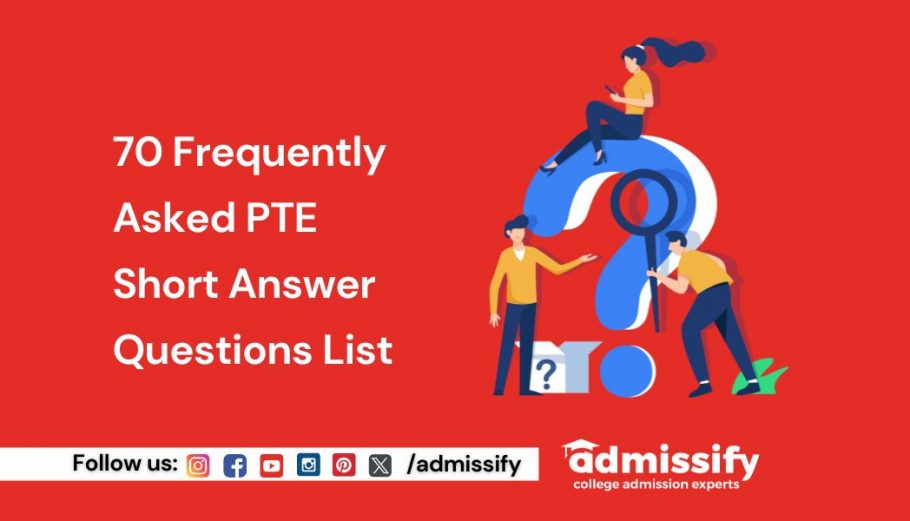Last Updated on October 19, 2024
The PTE Academic (Pearson Test of English) is a widely recognized English language proficiency test, particularly favored by students and professionals. One of its components, the PTE Short Answer Questions section, evaluates candidates’ ability to comprehend and respond to brief questions efficiently. This section typically includes 10 to 12 questions, each lasting about 9 seconds, requiring concise responses usually comprising one or two words. Scoring is straightforward: candidates earn one mark for each correct answer without penalties for incorrect ones.
Importance of PTE Short Answer Questions
The PTE Short Answer Questions segment assesses speaking skills and contributes to the overall listening score in the PTE Academic test. The questions cover a variety of everyday topics, allowing candidates to demonstrate their vocabulary, grammar, and pronunciation skills.
Tips for Success in the PTE Short Answer Questions Section
To excel in the PTE Short Answer Questions Section, consider the following strategies:

- Stay Calm: Anxiety can hinder performance. Approach each question with confidence.
- Think Simply: The correct answers are often straightforward; avoid overcomplicating your responses.
- Concentration is Key: Maintain focus throughout the section as it is continuous without breaks.
- Build Vocabulary: Familiarize yourself with common terms and phrases relevant to various topics.
- Practice Regularly: Engage in frequent practice sessions using official PTE resources to simulate exam conditions.
List of Frequently Asked PTE Short Answer Questions
Here is a compilation of 70 commonly encountered PTE short answer questions that you may encounter in the PTE exam:
| Question | Sample Answer |
| What is the capital city of Australia? | Canberra |
| What do we call a person who studies rocks? | Geologist |
| What is tax? | Money paid to the government |
| Which is not a real form of transportation: hoverboard, submarine, spaceship? | Hoverboard |
| How many sides does a hexagon have? | Six |
| What do you call a doctor who treats children? | Pediatrician |
| Who acts in a play or movie? | Actor/Actress |
| If the temperature is rising, is it increasing or decreasing? | Increasing |
| What punctuation mark shows the end of a question? | Question mark |
| Is solar energy renewable? | Yes |
| What term describes two babies born at the same time? | Twins |
| What is the opposite of fast? | Slow |
| Which planet is known as the “Red Planet”? | Mars |
| How many strings does a violin have? | Four |
| What appliance cooks food using hot air circulation? | Oven |
| Who studies weather? | Meteorologist |
| What is the opposite of hot? | Cold |
| Which building allows astronomers to observe celestial objects? | Observatory |
| Who writes books or stories? | Author |
| Who specializes in treating the heart? | Cardiologist |
| Which transportation uses tracks? | Train |
| What study focuses on Earth’s atmosphere and weather? | Meteorology |
| How many continents are there on Earth? | Seven |
| What measures temperature? | Thermometer |
| Who leads an orchestra? | Conductor |
| Which animal is known as “king of the jungle”? | Lion |
| What gas do humans breathe primarily? | Oxygen |
| What line separates countries politically? | Border |
| Who travels to space? | Astronaut |
| What organ pumps blood in the body? | Heart |
| If the Moon blocks sunlight, what event occurs? | Solar eclipse |
| What gas makes up most of Earth’s atmosphere? | Nitrogen |
| What document gives voting rights? | Ballot |
| What set of instructions helps cook a dish? | Recipe |
| Which energy source is renewable: wind or coal? | Wind |
| What large ocean lies between North America and Europe? | Atlantic Ocean |
| Who takes care of teeth and oral health? | Dentist |
| How many wheels does a tricycle have? | Three |
| What is the center of an atom called? | Nucleus |
| Name an extinct animal from prehistoric times. | Dinosaur |
| Who operates on patients in hospitals? | Surgeon |
| How many days are in a leap year? | 366 |
| What punctuation shows excitement or emphasis? | Exclamation mark |
| Which part of the body do we use for smelling? | Nose |
| Where are plays and performances shown? | Theater |
| Which instrument measures temperature: thermometer or barometer? | Thermometer |
| What green pigment helps plants photosynthesize? | Chlorophyll |
| How many players are on a basketball team? | Five |
| Who specializes in treating eyes? | Ophthalmologist |
| Name a musical instrument with six strings played with a pick. | Guitar |
Read Also:
| PTE Collocation List | Bar Graph PTE |
| PTE Read Aloud | Summarize Spoken Text PTE |
| PTE Describe Image Map Chart | PTE Writing Essay Template |
| 50+ PTE Spelling List | PTE Vocabulary List |
Conclusion
The PTE Short Answer Questions section plays a crucial role in evaluating quick thinking and language skills. Mastery requires effective time management and consistent practice. By familiarizing yourself with common questions and employing strategic preparation methods, you can enhance your performance and achieve your desired score on this critical segment of the PTE Academic test.
Read Also:
| PTE Exam | PTE Exam Pattern & Structure |
| PTE Exam Center In India | PTE Score Chart |
| PTE Exam Preparation | PTE Books |
| PTE Mock Test | PTE Syllabus |
| PTE Cut Off | PTE Slot Booking |
| PTE Registration | PTE Speaking |
FAQs for PTE Short Answer Questions
What is the PTE Academic exam?
The PTE Academic is an English language proficiency test designed to assess the speaking, writing, reading, and listening skills of non-native English speakers, primarily for study abroad purposes.
How long does the PTE exam take?
The total duration of the PTE exam is approximately 2 hours, which includes all sections: Speaking & Writing (54-67 minutes), Reading (29-30 minutes), and Listening (30-43 minutes).
What types of questions are included in the Answer Short Question section?
This section typically includes brief questions that require concise answers, usually one or two words, covering various everyday topics.
How is the PTE exam scored?
Each correct answer earns one point, with no penalties for incorrect answers. The scoring is based on various criteria, including accuracy and fluency.
What should I focus on to prepare for the Answer Short Question section?
Focus on building your vocabulary, practicing common phrases, and improving your listening skills to understand questions clearly before responding.
Can I take the PTE exam online?
Yes, the PTE exam can be taken at designated test centers or through a Home Edition option that allows candidates to take the exam from home under secure conditions

Simran is a seasoned content writer with a Master’s degree in Clinical Psychology. Her extensive expertise in research enables her to effectively guide students in their study abroad endeavors, particularly in navigating the complexities of choosing the right programs and universities. With a passion for education and mental health, Simran combines her writing skills and psychological insights to create informative content that empowers students to make informed decisions about their academic futures. Her commitment to helping others is evident in her work, as she strives to provide valuable resources for aspiring international students.




